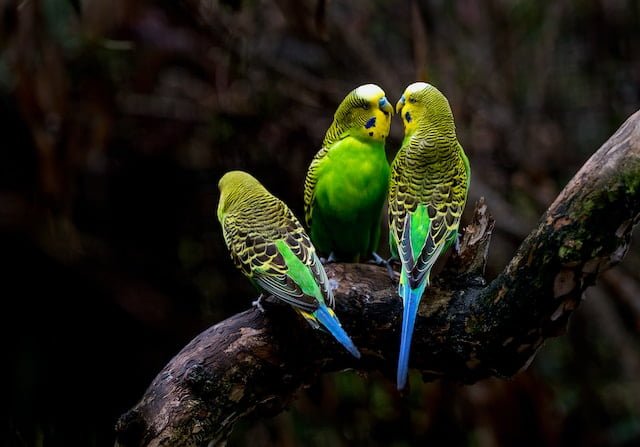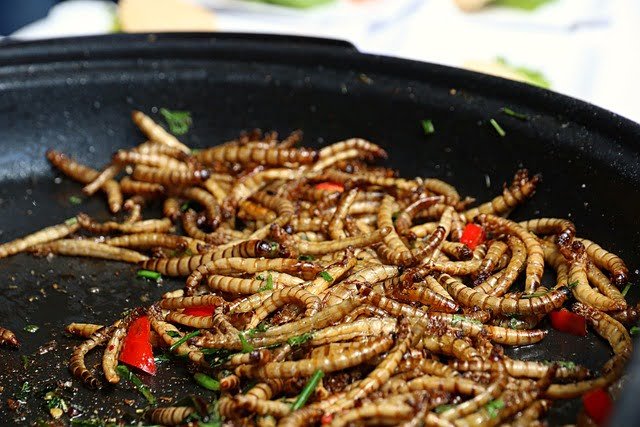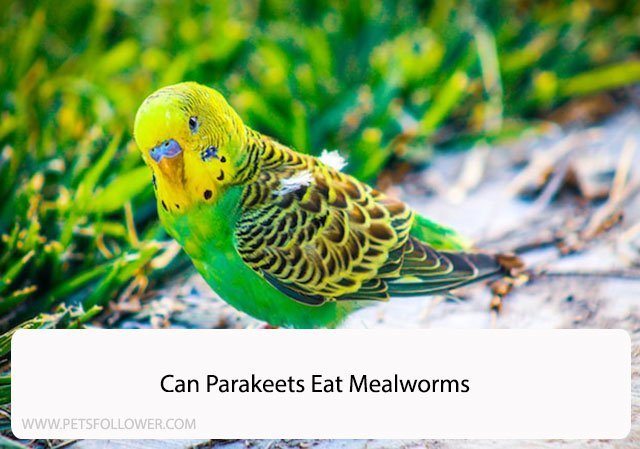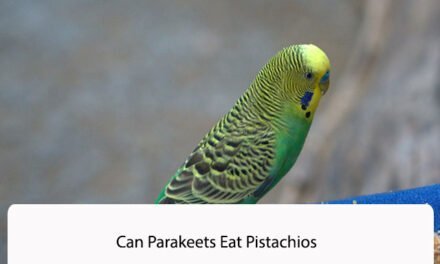Parakeets are one of the most popular pet birds in the world. They are known for their beautiful colors, playful personalities, and their ability to mimic human speech. As a pet owner, it’s important to provide your parakeet with a balanced and nutritious diet to keep them healthy and happy. One question that often comes up is whether or not parakeets can eat mealworms.
Mealworms are a popular treat for many types of birds, including chickens, ducks, and wild birds. They are high in protein and other nutrients, making them a great source of energy for birds. However, when it comes to parakeets, the answer is not so straightforward. While some parakeet owners swear by feeding their birds mealworms, others are hesitant to do so. In this article, we will explore the topic of whether or not parakeets can eat mealworms and provide you with the information you need to make an informed decision for your feathered friend.

What Are Mealworms
Mealworms are the larvae of the darkling beetle. They are a common food source for many birds, including parakeets. Mealworms are high in protein and fat, making them a nutritious addition to a bird’s diet.
Nutritional Value of Mealworms
Mealworms are an excellent source of protein and fat, making them a great addition to a parakeet’s diet. They are also rich in vitamins and minerals, including:
- Vitamin B12
- Iron
- Calcium
- Potassium
Mealworms are also low in carbohydrates, which makes them a good choice for parakeets who need to watch their sugar intake.
In addition to being a good source of nutrition, mealworms are also easy to digest. This means that parakeets can quickly and easily absorb the nutrients they need from these tasty treats.
Overall, mealworms are a nutritious and delicious addition to a parakeet’s diet. Just make sure to feed them in moderation, as too many can lead to weight gain and other health problems.
Parakeets Diet in the Wild
In the wild, parakeets have a varied diet that consists of seeds, fruits, vegetables, and insects. Their diet varies depending on the season and availability of food in their habitat.
Seeds make up a significant portion of their diet, and they consume a variety of seeds, including grass seeds, weed seeds, and tree seeds. In the wild, they spend a considerable amount of time foraging for seeds.
Parakeets also consume fruits and vegetables, such as apples, pears, berries, carrots, and leafy greens. These foods provide essential vitamins and minerals that are necessary for their overall health.
Insects are also an important part of their diet, especially during the breeding season when they need additional protein to support their reproductive efforts. They consume a variety of insects, including mealworms, crickets, and grasshoppers.
Overall, parakeets have a diverse diet that includes seeds, fruits, vegetables, and insects. Providing them with a varied diet in captivity is essential for their health and well-being.
Parakeets Diet in Captivity
Common Foods for Captive Parakeets
As responsible pet owners, we need to ensure that our parakeets receive a healthy and balanced diet. In captivity, parakeets can eat a variety of foods, including:
- Pellets: These are formulated to provide all the nutrients that a parakeet needs. They come in different sizes and shapes, and some even have added vitamins and minerals.
- Seeds: Parakeets love seeds, but they should not make up the majority of their diet. A mixture of different seeds, such as millet, canary seed, and sunflower seeds, can be offered in moderation.
- Vegetables: Fresh vegetables such as carrots, broccoli, and spinach are excellent sources of vitamins and minerals. It is essential to wash them thoroughly and chop them into small pieces before offering them to your parakeet.
- Fruits: Parakeets also enjoy eating fruits such as apples, bananas, and grapes. However, they are high in sugar, so they should be offered in moderation.
Potential Risks and Benefits
While parakeets can eat a variety of foods, it is essential to be aware of potential risks and benefits. Here are some things to keep in mind:
- Pellets: Pellets can be an excellent source of nutrition, but they can also be high in fat and preservatives. It is crucial to choose a high-quality brand and monitor your parakeet’s weight.
- Seeds: Seeds are high in fat and low in nutrients, so they should only make up a small portion of your parakeet’s diet. Overfeeding seeds can lead to obesity and other health problems.
- Vegetables: Fresh vegetables are an excellent source of vitamins and minerals, but some vegetables can be toxic to parakeets. For example, avocado and rhubarb should be avoided.
- Fruits: Fruits are high in sugar, so they should only be offered in moderation. Some fruits, such as grapes and raisins, can be toxic to parakeets.
In conclusion, a healthy and balanced diet is essential for the well-being of our parakeets. By offering a variety of foods in moderation and being aware of potential risks and benefits, we can help our feathered friends live a long and healthy life.

Can Parakeets Eat Mealworms
Digestive System of Parakeets
As omnivores, parakeets have a digestive system that is well-equipped to handle a variety of foods. Their digestive tract includes a crop, proventriculus, gizzard, small intestine, and large intestine. The crop is a sac-like organ where food is temporarily stored before entering the proventriculus, where digestive enzymes and acids are secreted. The gizzard is a muscular organ that grinds and breaks down food before it enters the small intestine, where nutrients are absorbed. The large intestine is responsible for water absorption and waste elimination.
Mealworms are high in protein and fat, which can be beneficial for parakeets. However, their exoskeleton can be difficult to digest, especially for young or elderly birds. Therefore, it is important to feed mealworms in moderation and ensure that they are properly prepared.
Potential Health Impacts
Feeding mealworms to parakeets can have potential health impacts if not done correctly. Mealworms can carry harmful bacteria, such as Salmonella, which can cause illness in birds and humans. Therefore, it is important to purchase mealworms from a reputable source and ensure that they are properly cleaned and cooked before feeding them to parakeets.
Additionally, mealworms should not be the sole source of protein in a parakeet’s diet. A balanced diet for parakeets includes a variety of fruits, vegetables, seeds, and grains. Overfeeding mealworms can lead to obesity and other health problems.
In conclusion, parakeets can eat mealworms in moderation as part of a balanced diet. However, it is important to properly prepare and clean the mealworms to avoid potential health risks.
Alternatives to Mealworms for Parakeets
While mealworms are a popular treat for parakeets, there are other options available that can provide similar nutritional benefits. Here are a few alternatives to mealworms that you can consider for your feathered friend:
Crickets
Crickets are a great source of protein and can be a fun addition to your parakeet’s diet. They are also easy to find at most pet stores and can be purchased live or freeze-dried. Just make sure to remove any uneaten crickets from your parakeet’s cage to prevent any potential health issues.
Waxworms
Waxworms are another high-protein option that can be given to parakeets as a treat. They are soft and easy to digest, making them a good choice for younger or older birds. However, they should be given in moderation as they are high in fat.
Vegetables and Fruits
Parakeets can also benefit from a variety of vegetables and fruits in their diet. Some good options include carrots, broccoli, kale, apples, and berries. These foods can provide essential vitamins and minerals that your parakeet needs to stay healthy.
Pellets and Seeds
Pellets and seeds are a staple in most parakeet diets and can provide a good source of nutrition. Make sure to choose a high-quality brand that is specifically formulated for parakeets and avoid seed mixes that are high in fat or low in nutrients.
Overall, while mealworms can be a tasty treat for parakeets, there are plenty of other options available that can provide similar nutritional benefits. By incorporating a variety of foods into your parakeet’s diet, you can ensure that they are getting all the nutrients they need to thrive.

Frequently Asked Questions
What are some safe and healthy foods for parakeets?
Parakeets require a balanced diet that includes a variety of fresh fruits and vegetables, seeds, and grains. Some safe and healthy food options for parakeets include apples, bananas, carrots, broccoli, kale, spinach, millet, and fortified parakeet seed mixes.
Are mealworms a good source of nutrition for parakeets?
Mealworms can be a good source of protein for parakeets, but they should not be the primary source of nutrition. Parakeets require a balanced diet that includes a variety of foods to meet their nutritional needs.
How often should parakeets be fed mealworms?
Parakeets can be fed mealworms as an occasional treat, but they should not be fed too often. We recommend limiting mealworms to once or twice a week.
What are some potential risks of feeding parakeets mealworms?
Feeding parakeets too many mealworms can lead to obesity and other health problems. Mealworms can also be contaminated with bacteria or parasites, so it is important to purchase them from a reputable source.
Can parakeets become addicted to mealworms?
Parakeets can become addicted to mealworms if they are fed them too often. It is important to limit mealworms to once or twice a week to prevent addiction.
Are there any alternatives to mealworms for feeding parakeets?
Yes, there are many alternatives to mealworms for feeding parakeets. Some safe and healthy options include cooked eggs, cooked chicken, and small amounts of cooked brown rice or pasta. Fresh fruits and vegetables should also be included in their diet.





